Stick¶
PPM Stick¶
General case¶
This is the case where the 1x ground unit (or BCS/PCS) sends commands directly to the 1x air unit.
Follow the steps below to perform a correct stick configuration on both units.
Ground unit¶
Go to Input/Output menu \(\rightarrow\) Digital Input panel.
Make sure that the following parameters have been configured:
Producer: CAP 1
Enabled
Select the pin to which the transmitter is connected (normally EQEP A (i.e., GPIO 17))
Edge detection: First rising edge
Consumer: PPM 1
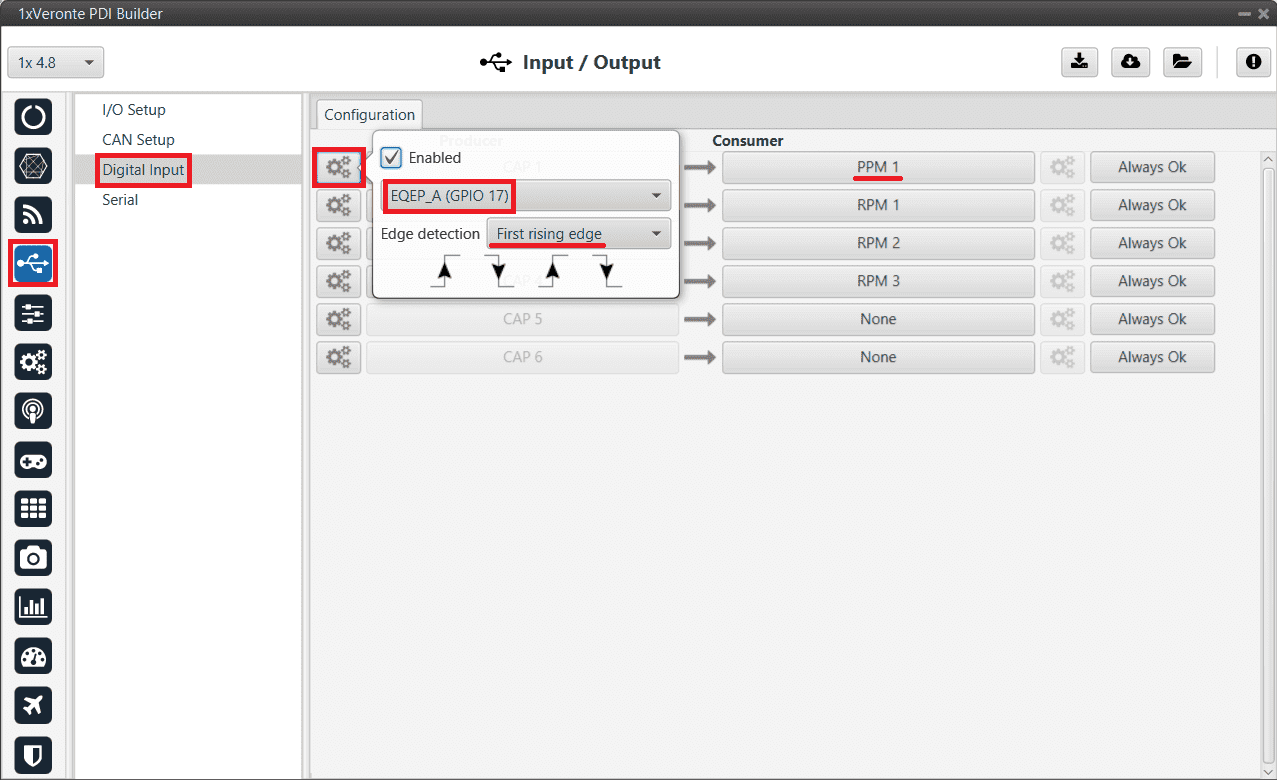
General case (Ground unit) - Digital Input configuration¶
Go to Connections menu \(\rightarrow\) GPIO panel.
Verify that the pin to which the transmitter is connected, in this case GPIO 17 (i.e., EQEP A), is set as input.
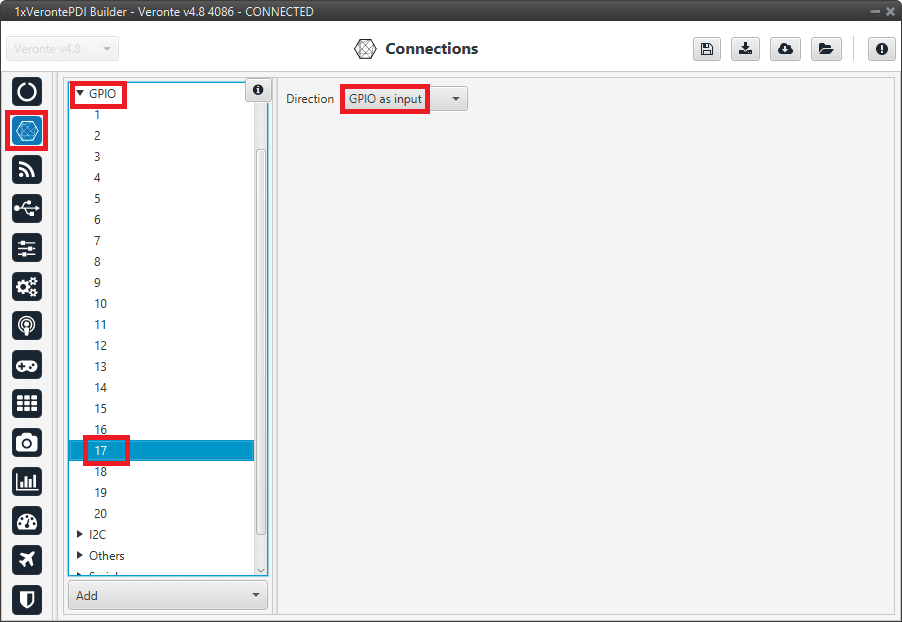
General case (Ground unit) - GPIO configuration¶
Go to Stick menu \(\rightarrow\) Transmitter 1 panel \(\rightarrow\) PPM tab.
Select the brand of transmitter that applies.
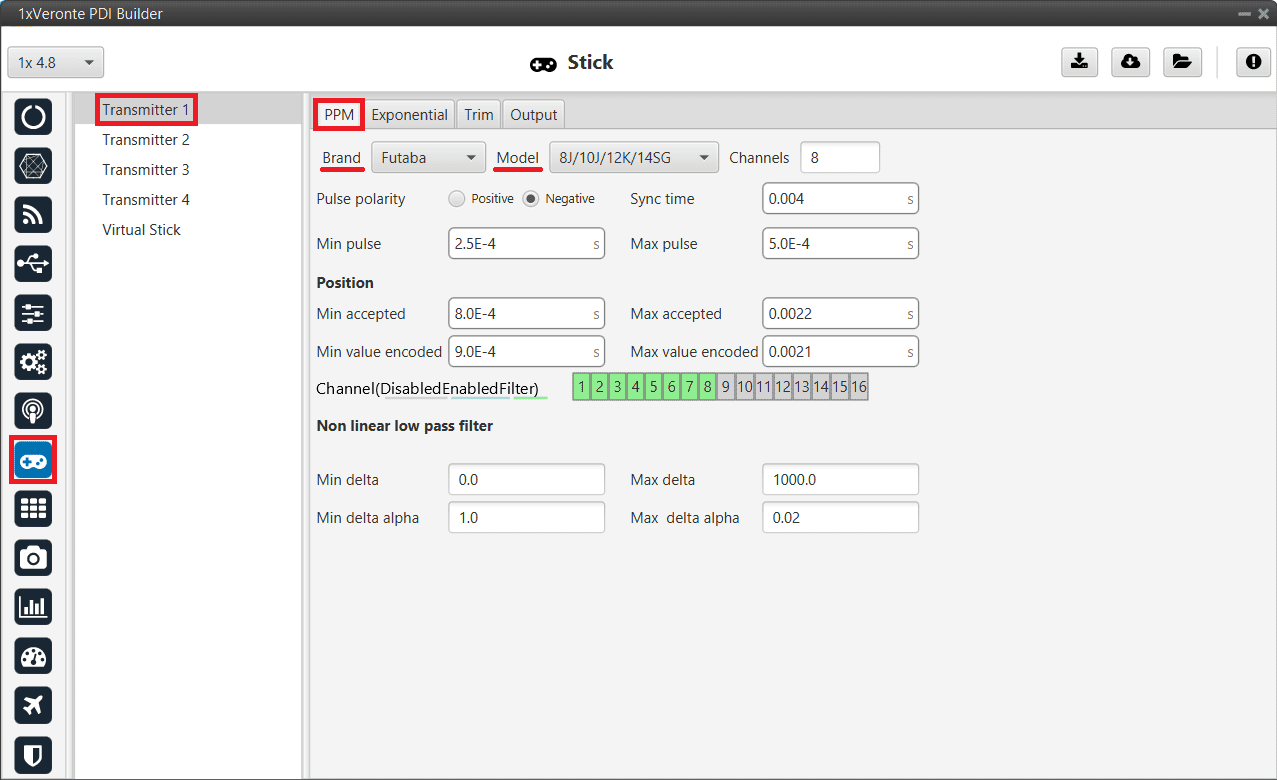
General case (Ground unit) - PPM configuration¶
Go to Stick menu \(\rightarrow\) Transmitter 1 panel \(\rightarrow\) Output tab.
Click on Enable and on Remote to send the stick information to the air unit. Please check the recommended values for the configurable parameters described in the Ouput - Stick section of this manual.
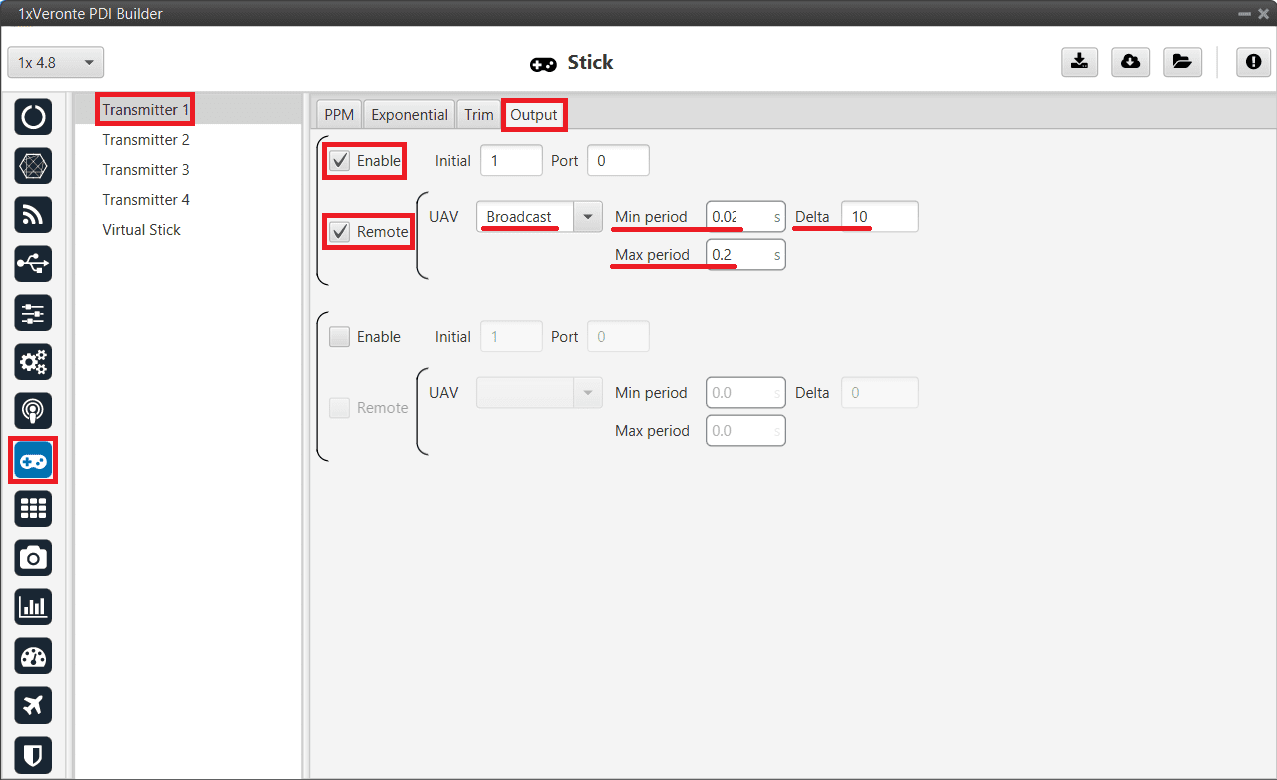
General case (Ground unit) - Output configuration¶
If all these settings are correct, users can check that ‘Stick PPM 1 not detected’ variable of the GND unit will be true.

Stick PPM 1 not detected variable - True¶
Air unit¶
Go to Stick menu \(\rightarrow\) Transmitter 1 panel \(\rightarrow\) PPM tab.
Select the brand of transmitter that applies (make the same configuration as the ground unit).
Go to Stick menu \(\rightarrow\) Transmitter 1 panel \(\rightarrow\) Output tab.
Just click on Enable.

General case (Air unit) - Output configuration¶
Go to Block Programs menu \(\rightarrow\) Stick program \(\rightarrow\) Double click on the Stick block \(\rightarrow\) Edit sources.
Note
Normally the user has a Stick Program where the blocks that are related to the stick are implemented, however, the name of the user’s program may be different.
Input the ground unit address to receive the stick information from that source and put it as the highest priority in the priority table. We recommend a Time Out of 0.4 s.

General case (Air unit) - Stick block configuration¶
Then, if all is correct, users can check that ‘Stick not detected’ variable of the AIR unit will be true.

Stick not detected variable - True¶
And that means that the communication between the GND and the AIR unit is correctly configured.
Simulation case (HIL)¶
In this case, the user is only using one Autopilot 1x.
So users will have to follow steps 1, 2 and 3 explained above for the ground unit, but also steps 2 and 3 of the air unit configuration. However, instead of entering the ground unit address, select the Local option.
On-board PPM receiver case¶
In this case, follow the steps below to configure the 1x air unit:
Go to Input/Output menu \(\rightarrow\) Digital Input panel.
Make sure that the following parameters have been configured:
Producer: CAP 1
Enabled
Select the pin to which the transmitter is connected (normally EQEP A (i.e., GPIO 17))
Edge detection: First rising edge
Consumer: PPM 1

On-board PPM receiver case - Digital Input configuration¶
Go to Connections menu \(\rightarrow\) GPIO panel.
Verify that the pin to which the transmitter is connected, in this case GPIO 17 (i.e., EQEP A), is set as input.

On-board PPM receiver case - GPIO configuration¶
Go to Stick menu \(\rightarrow\) Transmitter 1 panel \(\rightarrow\) PPM tab.
Select the brand of transmitter that applies.

On-board PPM receiver case - PPM configuration¶
Go to Stick menu \(\rightarrow\) Transmitter 1 panel \(\rightarrow\) Output tab.
Just click on Enable.

On-board PPM receiver case - Output configuration¶
If all these settings are correct, users can check that ‘Stick PPM 1 not detected’ variable of the AIR unit will be true.

Stick PPM 1 not detected variable - True¶
Go to Block Programs menu \(\rightarrow\) Stick program \(\rightarrow\) Double click on the Stick block \(\rightarrow\) Edit sources.
Note
Normally the user has a Stick Program where the blocks that are related to the stick are implemented, however, the name of the user’s program may be different.
Input the address as Local to receive the stick information from that source and put it as the highest priority in the priority table. We recommend a Time Out of 0.4 s.

On-board PPM receiver case - Stick block configuration¶
Then, if all is correct, users can check that ‘Stick not detected’ variable of the AIR unit will be true.

Stick not detected variable - True¶
And that means that the communication with the AIR unit is correctly configured.
USB joystick¶
Veronte software is able to detect USB devices such as joystick. The axis of these devices can be read and configured to send stick information to Veronte Autopilot 1x.
To configure them:
Connect the USB joystick to the computer.
Configure a Virtual Stick as explained in Virtual Stick - Integration examples section of this manual.
Note
It is also possible to convert USB joystick commands into PPM signals using the Veronte Stick Expander.
For more information about this product, please visit the Stick Hardware Manual or contact sales@embention.com.
Virtual Stick¶
To configure a virtual stick, follow the next steps:
Go to Stick menu \(\rightarrow\) Virtual Stick panel \(\rightarrow\) Input Variable tab.
Enable the virtual stick and enter an update period (we recommend 0.02 s).

Virtual Stick - Input Variable configuration¶
Go to Stick menu \(\rightarrow\) Virtual Stick panel \(\rightarrow\) Output tab.
Just click on Enable.

Virtual Stick - Output configuration¶
Go to Block Programs menu \(\rightarrow\) Stick program \(\rightarrow\) Double click on the Stick block \(\rightarrow\) Edit sources.
Note
Normally the user has a Stick Program where the blocks that are related to the stick are implemented, however, the name of the user’s program may be different.
Input App 2 to receive the stick information from the virtual stick widget and put it as the highest priority in the priority table. We recommend a Time Out of 0.4 s.
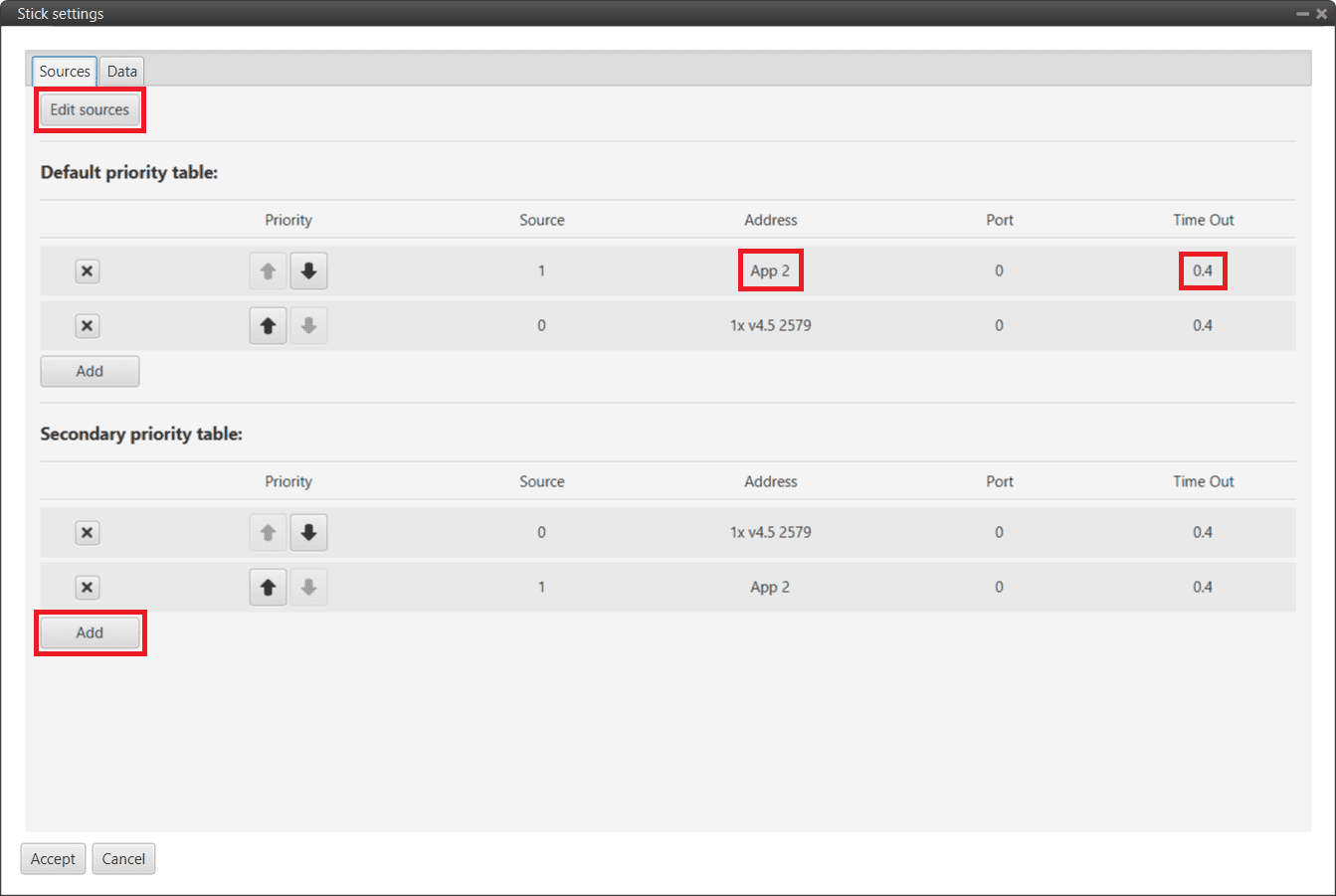
Virtual Stick - Stick block configuration¶
Configure a Virtual Stick Widget.
Please find an example of how to configure it in Stick widget - Integration examples section of the Veronte Ops user manual.
If the user creates a virtual stick to process the information received through a different channel than PPM (e.g., by CAN or ADC), the user will also have to:
Go to Stick menu \(\rightarrow\) Virtual Stick panel \(\rightarrow\) Input Variable tab.
Add the variables containing the stick information in Input Variable.
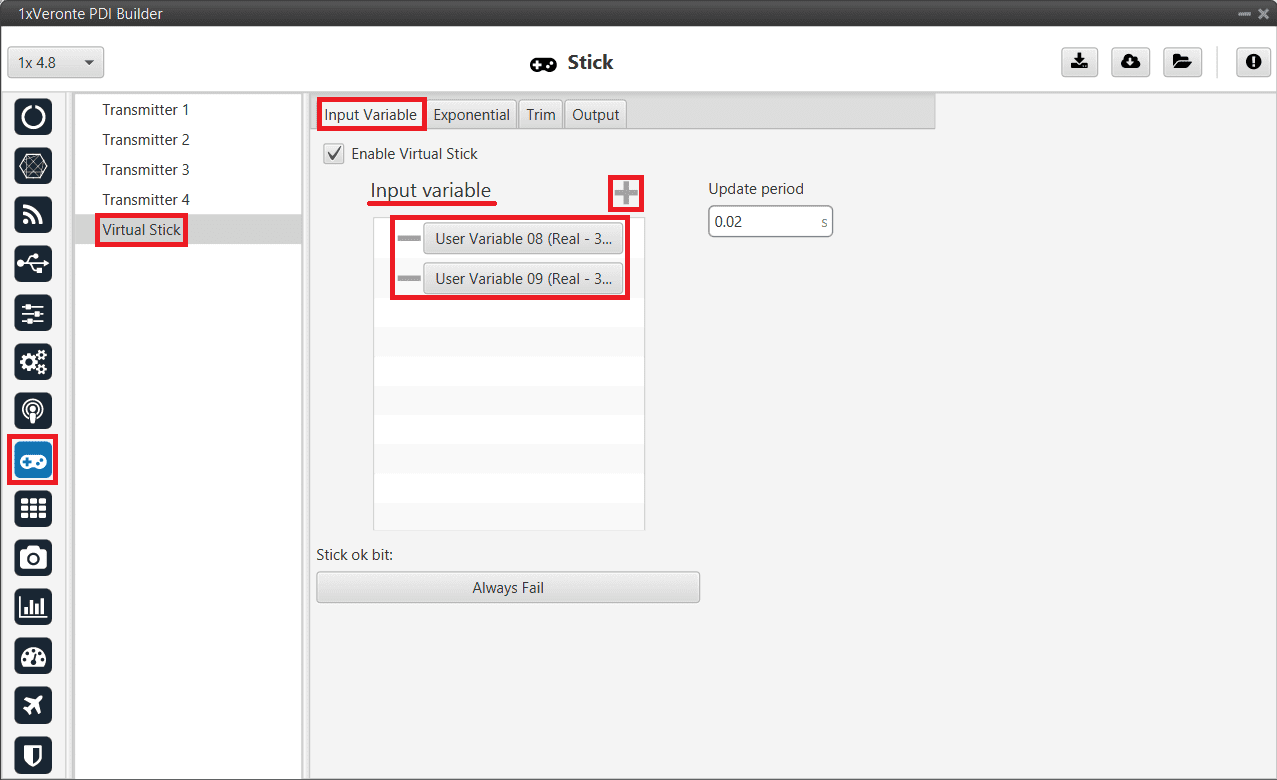
Virtual Stick - Input Variables added¶
